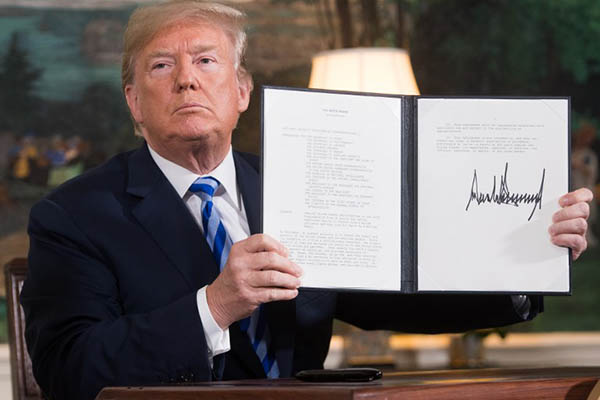
Saul Loeb—AFP
From the ashes of the old, a new world order is in the offing
U.S. President Donald Trump has finally decided to withdraw from a nuclear deal signed with Iran, announcing new sanctions to “punish” Tehran for its plans to build a nuclear bomb. The “no nukes” deal was signed in 2015 between Iran and “the P5+1,” that is, all five permanent members of the United Nations plus Germany to enable then-President Obama, of the Democratic party, to bypass a hostile Republican Congress who believed Iran unreliable. The deal was to end after 15 years, when Iran could go back to “normal enrichment,” which Trump thinks would be a prelude to Iran acquiring a bomb.
Trump won his presidency by pledging to undo the Iran deal and re-impose the sanctions that had crippled its economy. However, the other signatory states disagree with him, which means the sanctions would only come from America. That poses little relief for Iran, as most non-American business would not want to risk being sanctioned by Washington by continuing to deal with Tehran. Iran is understandably worried about this, despite the defiance it has shown through its rejectionist response. But the regional scene, already threatening world peace, is bound to get worse. The United States is being supported by nuclearized Israel, which feels threatened, and the Islamic schism that confuses the battlefield in the Middle East.
Israel views the potential Iranian bomb as an “Islamic bomb” meant to serve as “equalizer,” therefore threatening its regional dominance. But Muslims—i.e. Saudi Arabia—have their problem with what they regard as a “Shia” Iranian bomb. In the Gulf region, Iran is the only big state currently asserting its dominance through Iraq, Syria and Lebanon.
There was a time Pakistan hailed its own bomb as “Islamic,” but because of its own sectarian struggles, it has taken on a “Sunni” dimension, which some in the global community fear has the potential to be utilized by Saudi Arabia, which has threatened to become a nuclear state if Iran ever achieves its own bomb. Riyadh’s support of Trump’s withdrawal from the nuclear deal, however, suggests it could accept Israel’s aid instead.
For Iran, there is benefit in the two ongoing face-offs: one between Europe-plus-America and Russia, and the other between China and America. The old world order is breaking down and the new one will take time to emerge from the current chaos.
